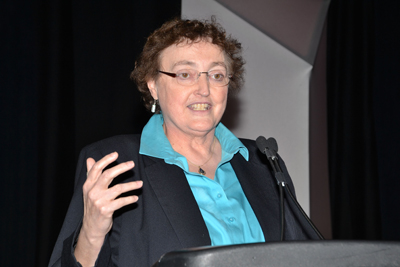
Kathryn Chaloner accepting her COPSS Elizabeth Scott Award
at last year’s JSM. Photo: Eric Sampson/ASA
Kathryn Chaloner, 60, passed away on October 19, 2014. She was a fellow of the ASA and the AAAS, and an elected member of the ISI. From 2002 to October 2014, Kathryn was Professor and Head of the Department of Biostatistics at the University of Iowa. A few months before she died, she had received the 2014 COPSS Elizabeth L. Scott Award at the Joint Statistical Meetings in Boston.
Kathryn was born in Crewe in Cheshire, UK, and she earned a bachelor’s degree (with honours) in mathematics from Oxford University, followed by a master’s degree (with distinction) in statistics from University College London. In 1978 she moved to the United States to work with the late Morrie DeGroot on her PhD in statistics at Carnegie Mellon University. In 1982 she started her academic career at the School of Statistics, University of Minnesota, progressing from an Assistant to a Full Professor by 1996. She moved to the University of Iowa in 2002 and was Head of Biostatistics with a secondary appointment in Statistics and Actuarial Science.
Early in her research career, Kathryn was a pioneer in the area of Bayesian optimal design, with her 1984 Annals of Statistics paper cited as the first work in the literature to develop a Bayesian optimal design theory for linear models. This was followed by papers exploring Bayesian optimality in other scenarios, including various non-linear models (see Chaloner and Larntz, 1989 and 1992, JSPI) and compartmental models (Atkinson et al., 1993, Biometrics). Another highly cited paper is a 1995 review article on Bayesian experimental design in Statistical Science, co-authored with Isabella Verdinelli. In the same time period, Kathryn’s first PhD student, Merlise Clyde, was awarded the 1994 Savage Award for her dissertation entitled “Bayesian Optimal Design for Normality”. During these years, Kathryn also worked on Bayesian outlier detection and residual analysis, with Chaloner and Brant (1988, Biometrika) and Chaloner (1991, Biometrika) standing out as notable contributions. In the 1990s Kathryn also developed an interest in prior elicitation, especially in clinical trials, with much of her subsequent work focusing on studies of HIV and AIDS.
After her move to Iowa, along with developing the Biostatistics program—including a very successful Summer Institute in Biostatistics program—and maintaining an active research program, Kathryn devoted much energy to her passion for diversity and inclusion of underrepresented groups. In 2011 she received the University of Iowa Diversity Catalyst Award in “recognition of innovative and distinctive efforts to enhance diversity and inclusion.” She also became an active member of the National Alliance for Doctoral Studies in the Mathematical Sciences, heading up the Statistics and Biostatistics initiative, advocating for the inclusion and mentoring of individuals from underrepresented groups in the US. [She wrote an article about this in the December 2013 Bulletin.]
The citation for her 2014 Elizabeth L. Scott Award aptly describes her efforts “for her commitment and success in developing programs to encourage and facilitate women to undertake careers in statistics; for extensive mentoring of women students and young faculty; for work to identify and remove inequities in employment for underrepresented components of the profession; and for serving as a role model, balancing work and family while excelling as a teacher, researcher and academic administrator.”
Other tributes to Kathryn describe various aspects of her professional and personal life. Rob Weiss at UCLA Biostatistics gives a wonderful personal perspective from his days as a student at UMN (https://faculty.biostat.ucla.edu/robweiss/node/169). Richard Smith, Director of SAMSI, has fond memories of Kathryn as a fellow student at Oxford and later as an organizer of a Math Alliance Workshop at SAMSI (https://samsiatrtp.wordpress.com/2014/10/). Amstat News, along with newspapers in Iowa City describe her love of travelling with her family—her husband Luke Tierney and sons Graham and Patrick, who survive her—of creating a garden to attract hummingbirds, and of playing the flute.
Others have shared their memories and tributes, notably at the November 2014 Field of Dreams Conference by the Math Alliance, where part of a session was devoted to tributes to Kathryn by Phil Kutzko (University of Iowa) and Carlos Castillo-Chavez (University of Arizona), among others.
A memorial fund has been established in honor of Kathryn Chaloner through the University of Iowa Foundation to support underrepresented minority students in the College of Public Health Department of Biostatistics. Contributions to this fund can be sent to: Kathryn Chaloner Student Scholarship Fund, UI Foundation, P.O. Box 4550, Iowa City, IA 52244-4550.
Written by Snehalata Huzurbazar, University of Wyoming
Comments on “Obituary: Kathryn Chaloner, 1954–2014”